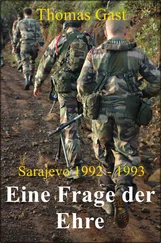Since the war began in Sarajevo, I haven’t come across a single atheist. Those familiar with the liturgy go to church or the mosque. Those who don’t, invent their own language of signs to convey their faith in a higher principle or god. They all carry an amulet in their pocket to help them survive the shelling. Each morning they wake up realizing how tiny and insignificant they are in terms of the cosmos. So they resolve to spend yet another day running with the crowd, hoping to appear more significant in number and thus worthy of salvation.
Only the robbers are different. At first there were only two kinds of people in Sarajevo — metaphysicians and robbers. The latter believed in a concrete future while the rest of us believed in a promised future, the one we’d promised ourselves upon realizing that we were different from the killers. Each new massacre gave us new hope in our suffering, and a belief that the horror was about to be stopped, if only because it had gone way beyond the boundaries of good taste. Nobody could believe that things would get worse after Mitterrand’s visit. He’d seen the devastation and therefore he understood. And if you understand — you’ll help us. When he left, the robbers put up the prices, and the Chetniks burned the city hall and all the documentary knowledge in it. It was a sign that the truth was not worth very much.
You remember the despair that followed. At first it was rumored that the Serbs would take the city, and then that they would kill everybody. As soon as we realized that neither event was going to happen, we understood that we had to be — different. The outside world became an object of hatred.
We only turned to God out of habit, or out of fear that the worst might happen, and so icy relations developed between people. Our next-door neighbor could have starved to death then — we no longer cared. Gloomy people dragged water containers around with them, cut down trees in parks and looked for plausible new choices. Foreign reporters began talking about “the hundred-year hatred” and incomprehensible tribal conflicts, and the Bosnians became less and less interested in convincing them otherwise. The war between the Muslims and the Croats marked the end of moderate warfare, the end of decency. People began to say the kind of things about one another that everybody had previously been saying only about the Serbs. They began to believe they would be saved if they just did the same as the others, that the world and God would offer them a chance to survive. If the rest of the world had failed to acknowledge what was good about the people of Bosnia, let them see what was evil.
Each day the political situation confirmed the lie about Bosnian hatred, a lie about this country of icy intolerance. But since nobody was interested in the truth, it stopped being used as an argument. If you ever write any sort of history of Bosnia, I doubt that it will even be mentioned. Not even as a footnote. If anybody does mention it, the truth will be as convincing to the Serbs as it is to the Croats and the Muslims. The Chetniks were guilty of crimes, but the others came to believe as a result of suffering that the Serbs were right in their tactics and that therefore they should think and behave in the same way. From now on, anything that happens will just be the reflex of evil, a kind of catharsis, but it will have nothing to do with the way Bosnia and Sarajevo used to be. Or at least not with the way I remember them.
I’m not telling you any of this as an excuse. I only want you to know the way I’m feeling as I leave Sarajevo, and what I’ll be like in the future. Besides, where I’m going nobody will ask me — a black man — about my Bosnia story, and yet I have to tell somebody. Who except you and Saša would even believe that I’d lived in Sarajevo?
When Morillon’s ark rose over Bosnia, I watched the country through the window until it vanished. From the sky it looks as though nothing has happened. The borders, fields and villages look just the same. You can even see the burned houses. I thought I could spot haystacks. From above, from an angel’s perspective, it’s easy to see what Bosnia used to be like. It flows gently like a curse into the glittering sea. The sun made my pupils dilate until they hurt and I couldn’t look any more. I remember, on the first spring day many years ago the owner closed his shop on Baščaršija and put up a notice saying, “Closed because of the sun.” Who’d want to work on the first day of spring?
Yours, M. L.
I understand the pathos of this letter, perhaps because its author will remain unknown to me. Letters are probably the last means by which you can talk about such things. Everything else that has been written about Sarajevo is just an attempt to create a framework for a new existence or to find the least painful way of dividing up life: the one that has already happened and should be forgotten and the one that’s coming, in which people will live comfortably and happily until death, as in a fairy tale.
Oh! I felt so good when I pinched the saxophonist’s girlfriend right from under his nose. We knew each other vaguely. I spotted her in the Belgrade taverna. She was by herself — I suppose she was waiting for somebody — I approached her, sat down, looked at her rather flirtatiously, sold her my blue-eyed gaze, plus lots of sweet nothings, blew her a kiss and then quickly became her boyfriend. Although I’m fat and sluggish, without movie-star appeal, I left the sax player for dead. He was tall and lanky, rather striking, but he didn’t communicate well and was always utterly silent except when he was playing the saxophone. He was a fixture in the Sarajevo clubs. He made young girls weak at the knees and was the unspoken fancy of all the marriageable types. But, you see, he valued words too highly, or perhaps he was afraid of language. In any case, he never managed to whisper the right words into the right ear to convey his particular appeal.
Very much in love, she and I walked up and down the promenade. Mind you, I’d politely say hello to him, and he would respond civilly, but she always felt a bit embarrassed. She wanted us to avoid certain streets and places, to hide away somewhere we wouldn’t bump into him. I always agreed, with dignity and understanding. I spoke highly of the saxophonist, though not without irony and the odd jibe at his inability to communicate. And just so she wouldn’t accuse me of being jealous, I confessed to being absolutely devastated that I couldn’t play the saxophone.
In the difficult and uncertain times that followed, I presented a solid front. My words hit home like a sniper’s bullets. I spoke without a grain of doubt about the beauty of sacrifice, or the unarmed storming of the Chetniks, even before those Serb marauders came upon the scene. I wanted to appear noble in her eyes, not only in terms of the rumpus of prewar years, but also in comparison to her former lover and his saxophone. In the days of party meetings, of clear but still-distant threats, the saxophonist became less relevant. I had succeeded in defeating him at the very beginning. Now I felt that I wanted to renew my victory every day. I told her about how I met the state president. I divulged information that would become common knowledge a week later, and all because I wanted to make the sax player and his jazz rhythms insignificant.
I entered the war despising his saxophone. The guy was a Serb, after all, and when the time came, I really expected him to vanish from the city and reappear in Pale, with or without the saxophone. It would prove that she had made the right choice and that the good guys in this movie didn’t have to be handsome, or the bad guys ugly. But the sax player didn’t leave. Often I would bump into him in town and greet him more heartily than ever, because it was necessary to show that even in desperate times one was sensible enough to distinguish between those who fired guns and those who played music.
Читать дальше










